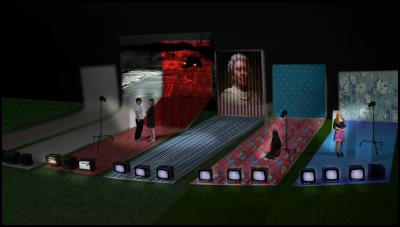Earthquakes in London
/
Earthquakes in
London
Disturbance, disconnection, fractured
family relationships and an uncertain future. Mike
Bartlett’s play jolts our reality and then challenges us
to engage with it.

Earthquakes in London
centres on a family of three sisters and their relationships
with each other and their estranged father. First performed
in 2010 at the National Theatre in London, it was described
by Charles Spencer of the Daily Telegraph as “the
theatrical equivalent of a thrilling roller-coaster ride”,
but the most challenging aspect of the play is its scale. A
cast of 16 third year actors from Toi Whakaari will tackle
more than 30 roles in a show that leaps from 1968 to the
present day and then jumps ahead to the mid 21st century as
well. The script itself is a huge challenge for director and
Toi Whakaari tutor Jonathon Hendry, who must lead one of the
broadest teams that Toi Whakaari can put together to reveal
Bartlett’s vision:
“Disturbance, that’s the single most important word for me in this play. It runs through the play and affects everything within it. The scale of the play is immense, it almost breaths, expanding outwards and then lurching into extreme close up and then pulling back out again. It’s a shake up, the earthquake metaphor runs through the whole play, the plates that crash together are reflected in the fractured family and personal relationships of the characters, there is a constant sense of pressure, disconnection and imminent destruction, that we’re all standing on a precipice, emotionally and environmentally.”
The staging of a production with this kind of breadth brings a myriad of challenges for the cast and crew. The production involves students from almost every year group of every course at Toi Whakaari; actors, technicians, managers, costumiers and designers. Third year design student Oliver Morse is responsible for the overall look and feel of the production and has been struck by how his fellow students have approached such a challenging play with a real sense of ambition:
“In the midst of learning how to cope with the scale of the production, and my leadership role within that, I have been inspired by the work of those around me. The sense of ambition and the leaps of faith that my fellow students are willing to take to discover new things and test themselves are amazing. I want the audience to be dancing in their seats. I hope that after they leave, the show will resonate with them, and hopefully an hour, a day or a week later there will be traces, questions, a residue left over that will still be affecting them.”
Earthquakes in London plays with theatrical form, it disturbs our notion of what a play ‘should’ be. Disturbance, joy, excitement, tension, the play’s rhythm will engage the audience and take them along for the ride.
“This is an incredibly theatrical play, it uses every trick it can, it has song, dance, audio-visual elements, soundscapes, movement, and it doesn’t let the audience rest. It plays with magic realism, perception shifts, imagination, it reminds me of all the wonderful things that live theatre can do.” Jonathon Hendry, director.
-ends-


 David Hill - LDR: Surge In Young Parents’ College Enrolments
David Hill - LDR: Surge In Young Parents’ College Enrolments NZEI Te Riu Roa: School Lunches - Give Schools Option To Use In-School And Community Providers Immediately, Union Says
NZEI Te Riu Roa: School Lunches - Give Schools Option To Use In-School And Community Providers Immediately, Union Says University of Auckland: Billion-dollar Business Lessons From Kiwi Entrepreneur
University of Auckland: Billion-dollar Business Lessons From Kiwi Entrepreneur NZ Veterinary Association: NZVA Celebrates Welcome Additional Support From Veterinary Nurses
NZ Veterinary Association: NZVA Celebrates Welcome Additional Support From Veterinary Nurses Michael King Writers Centre: New Zealand’s National Writer-Residency Organisation Announces Its 2025 International Residency With Australia
Michael King Writers Centre: New Zealand’s National Writer-Residency Organisation Announces Its 2025 International Residency With Australia Endometriosis NZ: Desogestrel Funding A Major Boost For Endometriosis Patients
Endometriosis NZ: Desogestrel Funding A Major Boost For Endometriosis Patients